Search
Our Site
-
Recent Posts
Archives
- September 2023 (1)
- April 2023 (2)
- June 2022 (1)
- May 2022 (1)
- March 2021 (2)
- June 2020 (3)
- July 2019 (1)
- April 2019 (1)
- May 2018 (2)
- April 2017 (1)
- January 2016 (1)
Useful Links
More
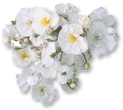
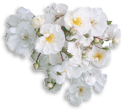


As we approach our Opening, Fifty Shades of Green, on 14 May, http://www.duttonhall.co.uk/ the trees are starting to show leaf. In the past four days Quercus rubra ‘Evenly Gold’ has developed noticeably, although initially the leaves are yellow, they develop to green over a few weeks. As with most new leaf on oak trees it is tinged or veined in pink
Quercus rubra ‘Evenly Gold’ – Day 1
Quercus rubra ‘Evenly Gold’ – Day 4
Rosa Banksiae lutescens, this is a sweetly scented climber with comparatively few thorns. The hips when formed are yellow.
Rosa Banksiae lutescens
Liriodendron tulipifera, this member of the magnolia family has distinctive tulip shaped leaves and upturned yellowish flowers that also resemble tulips. Our tulip tree is producing quantities of flower for the first time in 40 years, a tribute perhaps to the lady who planted it and sadly died recently.
Liriodendrum tulipifera
Just into flower this little gem, a native of China, sometimes called the Elderflower Rose; it is closely related to rosa banksia. Introduced before 1820.
Rosa cymosa
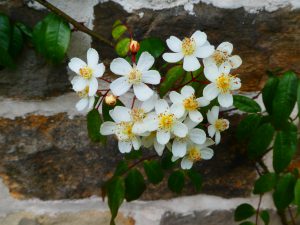
The first roses are usually the Scot’s Briars, despite the rain and the wind, this year is no exception and they are now starting to show. This is a particularly strong yellow variety, known as Persian Yellow
We enjoy the pleasures of the wildlife in the garden – hedgehogs grunting in the evening, owls, bats, dragonflies, butterflies, bees and bumblebees and of course, birds; our swifts fledged this week, the swallows and kestrels earlier. We very much enjoy watching our hares, but we have to use fences to keep some varieties of rose off their diet.
Rosa fedtschenkoana comes from the Pamir region of Central Asia, and is named after a Russian botanist. It forms a bushy shrub up to 2.5 metres high and the same across and suckers. The flowers are white, up to 5 cm across, and are borne singly or in small clusters throughout the summer. The flowers have a slight scent, supposedly reminiscent of ‘Hovis’ bread with blackberry jam. The orange-red hips are small, pear-shaped and bristly. It is one of the few remontant wild roses.
Rosa fedtschenkoana
The sudden storms of this weekend dampened our garden thoroughly. Luckily the photographs taken last week serve to remind us how splendid the roses looked. We very much hope that a few days of dry weather will allow the plants to recover to their former glory.
Rosa chinensis mutabilis
Browsholme Rose
Thank you to all those wonderful people who turned out yesterday afternoon for our NGS opening. Over £2000 raised for our three charities. If you haven’t visited an NGS Garden, you can find one near you on their website. Enjoy a day out and a good tea! Here is a glimpse of our garden through the new Moon Gate
Moon Gate
Over the last few days, we have been looking for orchids in our wild grass areas, they are starting to appear. Meanwhile we have been delighted to have this display of Slipper Orchids that we keep in a pot.
Slipper Orchid
This attractive frilled rugosa rose showed its face this morning. Sometimes called Phoebe’s Frilled Pink. It grows to about 4 feet, and will repeat flower. It is quite thorny but its carnation like delicately scented, white blooms with touches of pink are charming
Rosa rugosa ‘Fimbriata’
This unusual birch tree, Betula medwedewii ‘Gold Bark’ has deeply veined dark green leaves, bark which can be bronze, gold and brown as it matures. In spring it has hanging and curious upright catkins. It is slow growing with a compact bushy habit
Betula medwedewii ‘Gold Bark’
Having been away from home for a little over a week, we had hoped to see some flower out in the garden on return, but no. There is plenty of bud about to burst, but the flowers like all of us are waiting for a little warmth. This week another flower from the greenhouse Rosa banksiae var banksiae – the double white version of the white Banksian rose. Sometimes known as Lady Banks’ rose, or just Banks’ rose, the species is native to central and western China, where it grows at 1600 – 7,000 feet above sea level.
Rosa banksiae var banksiae
This pretty rose, Rosa banksia lutescens, cocked a snook at the cold weather and flowered in the greenhouse last week. An unusual thornless rambling rose with scented little yellow single flowers and delicate, graceful foliage. The flowers are faintly scented. It is less often seen than R.banksia lutea.
Rosa banksia lutescens
The sun has shone brightly all month; the soil is starting to warm up- and of course the grass is growing, the weeds will be following soon! A little patch of erythronium add sparkle to the front garden.
The cold bright weather has helped the willow catkins to be “at their best”. Two examples below; they are fairly similar and perhaps more familiar than the Mount Aso and melanostachys catkins shown recently. They are much larger catkins and more showy.
Salix udensis
Salix candida
Our swallows arrived last week and seem to be enjoying the clear cold weather, but last night’s frost (-6 degrees) was probably a shock.
We are all familiar with Wordsworth’s “cloud” of daffodils; this host resembles the serried ranks of a regiment ready to face the enemy.
This week a larger plant, our R.macabeanum is beginning to show itself; dark glossy leaves, bell-shaped pale yellow flowers, which hang in large clusters. Originating from North East India, it adds is size and colour to the springtime palette of flowers here.
Rhodendron macabeanum
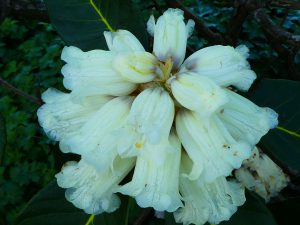 r
rThis delightful, delicate blue hepatica, a native of the Carpathian Mountains of Romania, has an RHS Award of Garden Merit. It is just starting to show its stunning flowers – another harbinger of spring.
Hepatica transsilvanica
The March winds blew all last week, but the willows showed their resilience. Last week it was black catkins this week – they are pink!
Salix gracilistyla ‘Mount Aso’
A very long wet Autumn was followed by a lengthy period of cold weather, which extended to the end of February. At long last we are starting to see the early signs of spring. The willow catkins are appearing; below are some black catkins.
Salix gracilistyla ‘Melanostachys’
This little white jewel, Parnassia foliosa foliosa has just come into flower; it has gleaming white feathery and frilled flowers that almost glow.
The wet weather has encouraged this willow to throw up some new growth. It is an unusual willow with an open growth habit. It was discovered around 1900 by EH Wilson, who thought it was a magnolia. It has vibrant purple edged new leaves turning to bluey-green when fully developed. Its catkins are tall, and slender.
Salix magnifica
Thank you to all those who braved the appalling weather yesterday and visited Dutton Hall. Whilst the numbers were not huge, the enthusiasm of the visitors shone through the gloom, wind and rain. To cheer us up enjoy this rose. Rosa Mundi is a sport of Rosa gallica officinalis. Known since the 12th Century, it is a bushy rose, hardy with flowers that are pink and white, and sometimes deeper crimson. It is also known as Rosa gallica versicolor.
Rosa Mundi or Rosa gallica versicolor
As part of a Plant Heritage Evening on Roses, Catherine will talk about our collection of Pemberton Roses. Two other collections holders will also speak on David Austin’s Roses and Rambling roses. The Evening is called Ravishing Roses, to join please register here or get in contact on email
Pemberton Hybrid Musk Felicia
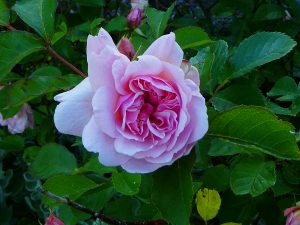
We have been blown away by the winds recently, but nature moves on. As all those who have visited this garden know we try to blend nature with cultivated plants. The cultivated plants are being held back by the weather but the trees are fully out
Our hares bred and there is a leveret about
And the Goldfinch are nesting
In The Times this weekend Joe Swift listed a few roses suitable for pots and gardens. We have many roses and one’s favourite changes from day to day. In anticipation of flowers to come, here are some that have already started to show flower.
Rose Ormston Roy
Rose Souvenir de Madame Leone Viennot
Rose Francesca
The vibrance of this double flowered white cherry is stunning against the blue skies of recent days.
Prunus avium plenum
Spring time is full of expectation, no more so than in a show of apple blossom that promises a harvest of fruit in the autumn.
Last year we planted some Snakeshead Fritillary. We are delighted that several have reappeared this year. It will encourage us to plant some more bulbs in the autumn
The slightly drier weather and a few hours of sunshine has brought out more of our catkins. Try these two.
Salix candida
These catkins are the size of the top joint of your thumb, fluffy – white and gold
Salix nakamurana var. yezoalpina
Originating from Northern Japan, an alpine willow, prostrate in habit with small puff-ball catkins the size of a 5p coin.
January has passed in a mist of gloom, February has brought some welcome growth in the garden. Our willows are starting to show themselves – Salix udensis ‘Sekka’ is giving a fine display of its delicate pinkish catkins.
A frost last night allowed this oak leaf to be photographed, as we say good bye to 2019.
We have had a few frosts in the last two weeks after which a local said “It is so good to have some iron in the ground”, another consequence has been wonderful early morning light.
There is little colour around in the garden to brighten up these dull November days, so, here is a late flowering plant from the greenhouse
Today’s stroll round the garden produced some strong yellow, gold, scarlet and ruby hues. It was misty but we heard geese although we were unable to see them.
Fagus sylvatica ‘Dawyck Gold‘
Crataegus persimilis prunifolia
A patch of mixed cornus
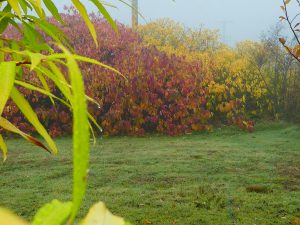
Walking round the garden this morning autumn was showing itself. The culmination was a large skein of Greylag geese flying in.
Rosa Rugosa ‘Rugspin‘
Quercus rubra
Gleylag Geese
This little oak tree justifies its name.
To coincide with the start of the Rugby World Cup; this little gem is a Japanese Willow of striking colours and often referred to as the ‘Flamingo Willow’. It is small in size, but it can be grown successfully as a “standard”.
This salix is looking splendid after the recent rain, it keeps these beautiful droplets for some considerable time after a shower.
The recent wet weather has encouraged a spurt of growth on many of our trees. This oak – Quercus texana “New Madrid” – has bright red leaves as they emerge, they fade to green before adopting autumn hues of deep red and plum.
In the last few weeks the press tell us there has been an invasion of 11 million Painted Ladies from the Continent. We have at least one here at Dutton.
Have you noticed the noticed the vast quantities of butterflies around this summer? Here is a Red Admiral on the flowers of hebe x divergens
Last night’s lunar eclipse was stunning and gave us an extra dimension to a romantic walk; the dog enjoyed it too!
This year’s early rain has encouraged the grasses to grow. Our garden is no exception; the range of meadow grasses are astounding and the soft waving stems provide a soothing background to the upright more rigid plants in our shrub borders.
This little gem has a profusion of eye-catching large pink flowers, and loves the full sun and warm stones of our rill-side bed.
The fascination of roses is not just in the flower, here we have buds and hips of Maigold. Strong colours, red and yellow reflecting the colour of the bloom with well-defined stamens.
In the Times this weekend, Alice Bowe listed her favourite yellow roses. We love this little gem,. It is not well known. It has bright yellow, neatly formed single flowers with attractive veining. These are followed by large, maroon hips. It forms an attractive, large, rounded shrub; it is hardy. Although it has a little scent it is loved by bees. It was raised in the Netherlands by Doorenbos in 1938.
The rose season is well under way now. The stunning rose of different shades of pink is flowering profusely on a south east facing wall.
This gem has started to show its stunning flowers; hopefully the plant will continue to flower until the end of July.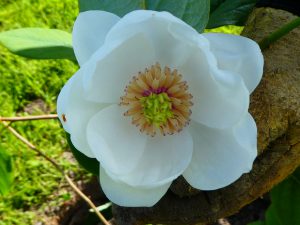
We have a number of different Crataegus in the Garden; they will form part of a Plant Heritage National Plant Collection dispersed throughout the North West of England. This is Crataegus Laevigata “Crimson Cloud, it is a vibrant red.
There is some confusion over this Rose; The Revd. Charles Wooley Dod did not name a rose in any of his writings or after himself and it may more properly be R. pomifera ‘Duplex’. There is an illustration of a rose from Wolley Dod’s home, Edge Hall, in Ellen Willmott’s book The Genus Rosa. The illustration shows a large shrub with grey green leaves and semi-double pink flowers and large red hips. This picture is of the rose in bud and when it comes into full bloom and it hips, it matches Willmott’s description. What is not in doubt is that the rose in the picture came from Edge Hall!
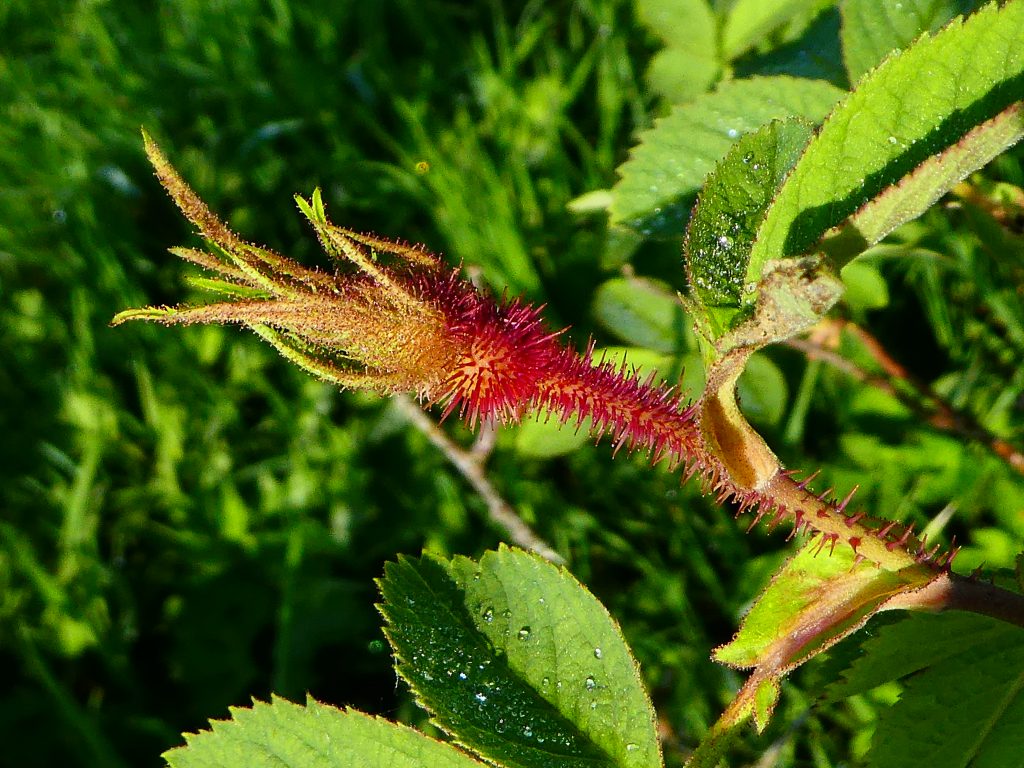
This is the double flowered version of R. banksiae lutescens. Buttery yellow with a light fragrance and powerful rambling habit, growing to 20 feet on the front of our house.
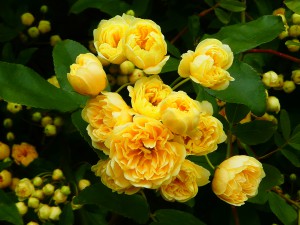 |
An unusual single yellow Banksian rose, rambling in habit, almost thornless, and delicately scented.
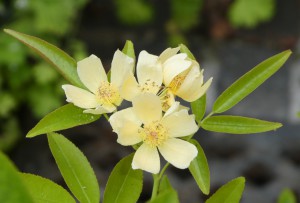 |
The Snake’s Head Fritiilary, a distinctive spring bulb which grows successfully in some of our grass areas.
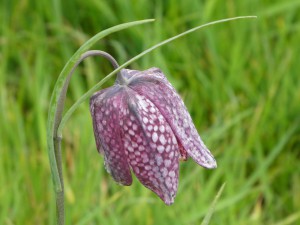 |
The delightfully petite flowers of the Willow Leaf Pear.
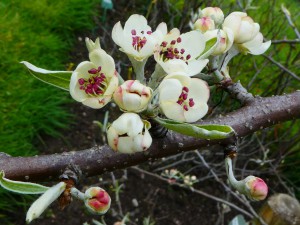 |
Flowering profusely with a delicate scent, this lovely Rhododendron
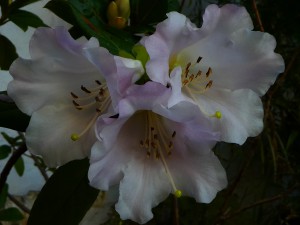 |
A few dry days and a bit a warmth and the garden starts to wake up.
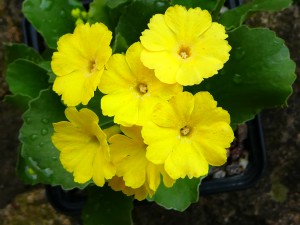 |
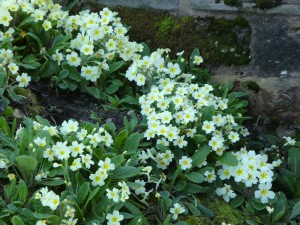 |
| Primula ‘Lindum Rapture’ | Primula vulgaris |
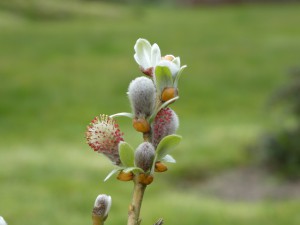 |
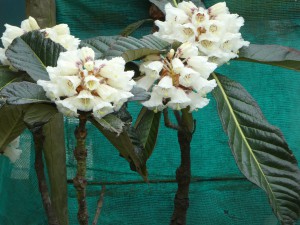 |
| Salix helvetica | Rhododendron sinogrande |
In the last week we have witnessed some stunning sunsets – clear, fierce red and sometimes with a contrasting vivid blue sky. These two pictures were taken on the same day only minutes apart.
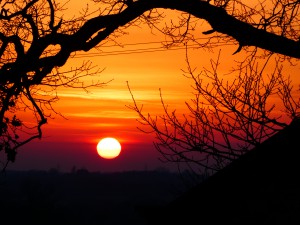 |
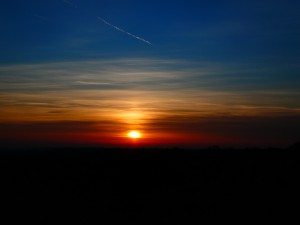 |
This Barn Owl has been around regularly in recent weeks, hunting methodically over some of our rough grass.
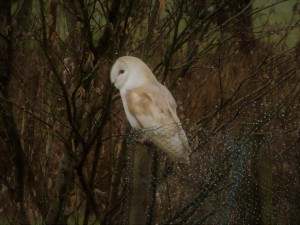 |
We missed the Super Blood Wolf Moon, but this morning brought some stunning scenery in the garden.
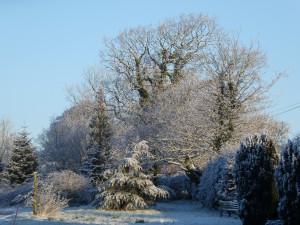 |
 |
| Up the Garden | Monkey Puzzle |
There are flowers to be seen in the garden, although any berries that remain will soon be eaten by the birds
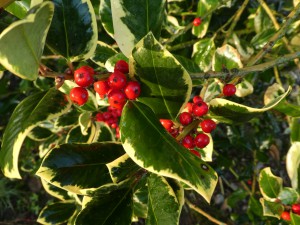 |
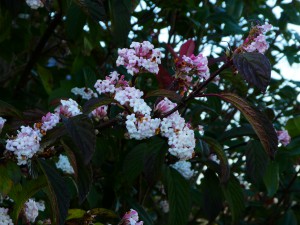 |
| Ilex Golden King | Viburnum x bodnantense “Dawn” |
The Pemberton Rose Danae is still flowering, we are hoping it will make Christmas
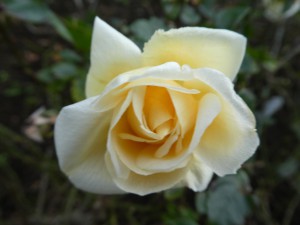 |
| Rose “Danae” |
And the valley views are becoming more wintry.
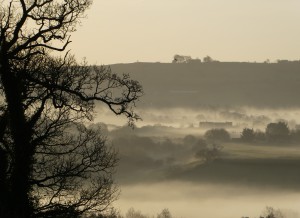 |
In 1917 Joseph Pemberton bred his Hybrid Musk rose “Pax”. In correspondence with his gardener, John Bentall who was on active service in France, he said the rose had been well received at the National Rose Society’s summer exhibition and that he planned to introduce it in 1918 if the Great War ended – fortunately, it did.
100 years on, this stunning white rose with large white blooms is still available and is a symbolic reminder of the end of “the war to end all wars”.
This rose deserves wider appreciation with very large semi-double flowers which are creamy-white to white with gold stamens. The petals are well formed and rolled at the edge. They are displayed in large, well-spaced clusters on wonderful arching stems, which are robust, and a reddish-brown and compliment the dark green foliage. Its scent is musky. It will grow into a bush up to 6 by 8 feet high.
And most significantly it flowers well into the Season of Remembrance
We have “Pax” within our Plant Heritage National Collection http://www.duttonhall.co.uk/rose-list/pemberton-and-bentalls-hybrid-musk-roses
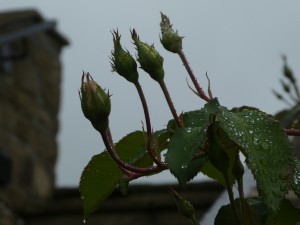 |
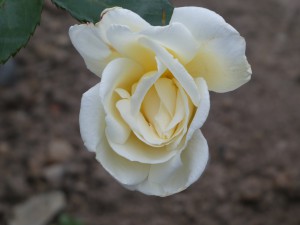 |
| Bud | Opening Bloom |
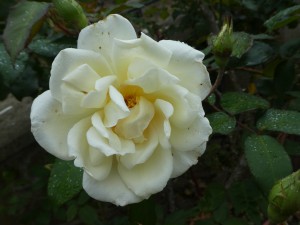 |
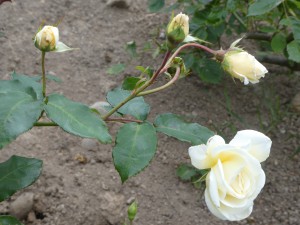 |
| Full Bloom | Stem |
This spiky little bromeliad is brightening up a dark corner of the greenhouse now.
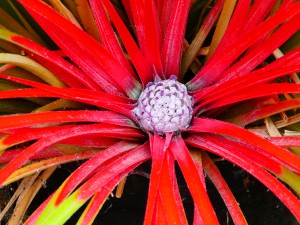 |
Autumn is here early this year. There is already a profusion of hips, haws, Crab apples and seeds. A testament to the long hot days of June and July, as well as insect pollination.
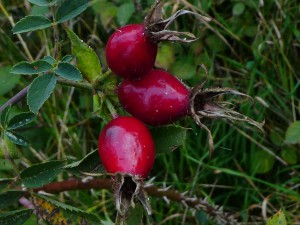 |
 |
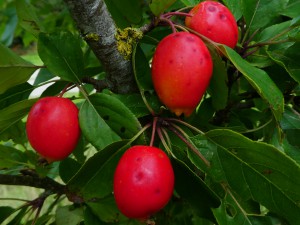 |
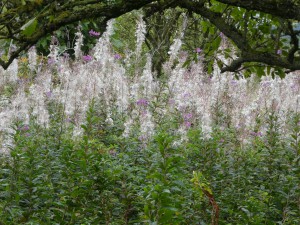 |
After the long dry spell, a period of damp days has caused an explosion of fungi in the shadier parts of the garden.
Sadly no field mushrooms yet!
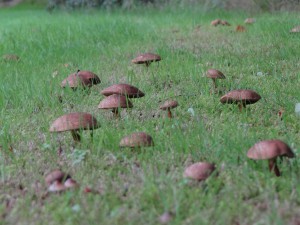 |
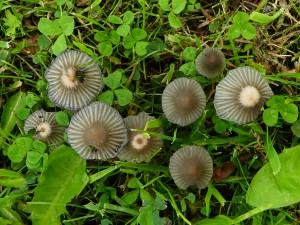 |
Water lilies are cool, well our’s are enjoying a wonderful show with their feet in the cool water of the pond. No doubt you are doing the same on the beach.